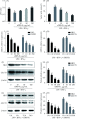sDR5-Fc inhibits macrophage M1 polarization by blocking the glycolysis
- PMID: 33995506
- PMCID: PMC8100429
- DOI: 10.11909/j.issn.1671-5411.2021.04.003
sDR5-Fc inhibits macrophage M1 polarization by blocking the glycolysis
Abstract
Background: M1 polarization of macrophages is an important pathological process in myocardial ischemia reperfusion injury, which is the major obstacle for the treatment of acute myocardial infarction. Currently, the strategies and mechanisms of inhibiting M1 polarization are poorly explored. This study aims to investigate the role of soluble death receptor 5-Fc (sDR5-Fc) in regulating M1 polarization of macrophages under extreme conditions and explore the mechanisms from the aspect of glycolysis.
Methods: Extreme conditions were induced in RAW264.7 cells. Real-time quantitative polymerase chain reaction and western blot were used to detect the expression of mRNA and proteins, respectively. Cell counting kit-8 was used to investigate the proliferation activity of cells. Expression levels of inflammatory cytokines were determined by enzyme-linked immunosorbent assay.
Results: We found that sDR5-Fc rescues the proliferation of macrophages under extreme conditions, including nutrition deficiency, excessive peroxide, and ultraviolet irradiation. In addition, administration of sDR5-Fc inhibits the M1 polarization of macrophages induced by lipopolysaccharide (LPS) and interferon-gamma (IFN-γ), as the expression of M1 polarization markers CD86, CXC motif chemokine ligand 10, matrix metalloproteinase 9, and tumor necrosis factor-α, as well as the secretion of inflammatory factors interleukin (IL)-1β and IL-6, were significantly decreased. By further investigation of the mechanisms, the results showed that sDR5-Fc can recover the LPS and IFN-γ induced pH reduction, lactic acid elevation, and increased expression of hexokinase 2 and glucose transporter 1, which were markers of glycolysis in macrophages.
Conclusions: sDR5-Fc inhibits the M1 polarization of macrophages by blocking the glycolysis, which provides a new direction for the development of strategies in the treatment of myocardial ischemia reperfusion injury.
Copyright and License information: Journal of Geriatric Cardiology 2021.
Figures





Similar articles
-
RBM4 regulates M1 macrophages polarization through targeting STAT1-mediated glycolysis.Int Immunopharmacol. 2020 Jun;83:106432. doi: 10.1016/j.intimp.2020.106432. Epub 2020 Apr 2. Int Immunopharmacol. 2020. PMID: 32248017
-
[Paeonol inhibits macrophage M1 polarization by down-regulating miR-155/JAK1-STAT1 pathway].Zhongguo Zhong Yao Za Zhi. 2020 May;45(9):2158-2164. doi: 10.19540/j.cnki.cjcmm.20200210.409. Zhongguo Zhong Yao Za Zhi. 2020. PMID: 32495566 Chinese.
-
Effects of sDR5-Fc fusion protein on infant mice with ulcerative colitis via the TRAIL-DR5 pathway.J Biol Regul Homeost Agents. 2020 Mar-Apr;34(2):525-533. doi: 10.23812/19-373-A. J Biol Regul Homeost Agents. 2020. PMID: 32425017
-
Augmented PFKFB3-mediated glycolysis by interferon-γ promotes inflammatory M1 polarization through the JAK2/STAT1 pathway in local vascular inflammation in Takayasu arteritis.Arthritis Res Ther. 2022 Dec 12;24(1):266. doi: 10.1186/s13075-022-02960-1. Arthritis Res Ther. 2022. PMID: 36510278 Free PMC article.
-
[Effect of Galectin-9/Tim-3 pathway on the polarization of M1/M2 subtype in murine macrophages induced by lipopolysaccharide].Zhonghua Wei Zhong Bing Ji Jiu Yi Xue. 2018 Sep;30(9):836-841. doi: 10.3760/cma.j.issn.2095-4352.2018.09.004. Zhonghua Wei Zhong Bing Ji Jiu Yi Xue. 2018. PMID: 30309408 Chinese.
Cited by
-
Differential Lung Protective Capacity of Exosomes Derived from Human Adipose Tissue, Bone Marrow, and Umbilical Cord Mesenchymal Stem Cells in Sepsis-Induced Acute Lung Injury.Oxid Med Cell Longev. 2022 Feb 27;2022:7837837. doi: 10.1155/2022/7837837. eCollection 2022. Oxid Med Cell Longev. 2022. PMID: 35265265 Free PMC article.
-
Metabolic Reprogramming of Innate Immune Cells as a Possible Source of New Therapeutic Approaches in Autoimmunity.Cells. 2022 May 17;11(10):1663. doi: 10.3390/cells11101663. Cells. 2022. PMID: 35626700 Free PMC article. Review.
-
The role of lung macrophages in acute respiratory distress syndrome.Inflamm Res. 2022 Dec;71(12):1417-1432. doi: 10.1007/s00011-022-01645-4. Epub 2022 Oct 20. Inflamm Res. 2022. PMID: 36264361 Free PMC article. Review.
-
Metabolic regulation of the immune system in health and diseases: mechanisms and interventions.Signal Transduct Target Ther. 2024 Oct 9;9(1):268. doi: 10.1038/s41392-024-01954-6. Signal Transduct Target Ther. 2024. PMID: 39379377 Free PMC article. Review.
References
LinkOut - more resources
Full Text Sources
